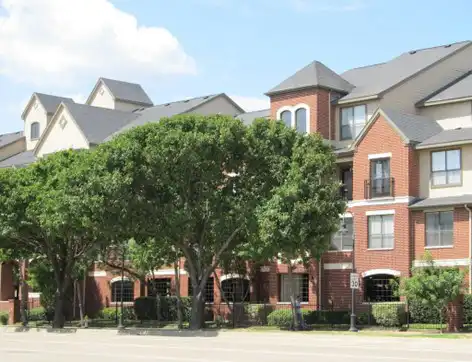
You’re shopping around for a home of your own, in an area where houses cost close to half a million dollars. Along the way, you’ve found a nice-looking condo complex, with available units from $260K. You could buy a condo now, build home equity, then make a larger down payment on a house later on. The condo won’t drain all your savings.
Would you be comfortable with the condo lifestyle, though? It’s a common quandary for aspiring homeowners. Some will go with the condo, and others will decide to go for the house if they can. Let’s break down the pros and the cons, so you can spot the key issues at play in this decision.
A Case for Buying the House Today
If you know you’re aiming for a house in the long run, why not buy it now? You’ll have your own land, and a buffer of space between you and the folks next door. Neighbors are a wild card, but with a house, at least you won’t be sharing a wall, floor or ceiling with an inconsiderate neighbor.
But you do need to be confident in your ability to cover the cost of owning a house. It doesn’t hurt to sit down with your accountant and compare the tax consequences of both possible choices.
You’ll also need to keep cash on hand in case of emergency. Your lender will scrutinize your assets and your potential financial risks when making a decision on your loan application.
The main difference, as far as your deed is concerned, is that a condo deed transfers the interior only. The land and infrastructure is owned and controlled by the association. If it’s important to you to hold the deed to your land, the house is the better pick. Still, allowing yourself more time to save up for a large down payment could be far less financially stressful.
Then again, if you’re understandably concerned about the financial burden, you could buy land that’s zoned to allow you to rent part of your property out — perhaps even build and rent out a backyard cottage.
But There’s No Rush to Choose a House
Yes, a house does tend to appreciate in value from the moment it’s purchased. With the cost of houses having risen so much lately, though, property values could stall over the next few years. We just don’t know. And note that a condo, too, will change in value along with its local market. A well-maintained condo property should keep its appeal long into the future. And its relative affordability, of course, can be a key selling point.
If you get a house, repair and replacement costs have to be covered by the homeowner alone — there won’t be bulk savings that condo properties enjoy. The windows and roof will likely need replacement. The driveway might, too. Plumbing fixes are on you. So is tree maintenance and landscaping. All of these are big-ticket items, and replacement costs can rise sharply with inflation, tariffs, worker shortages, and so on.
The cost of interest payments alone on a typical house is a lot to budget for.
It’s perfectly OK to take a pass on the house for now, and see what you think after a few years’ time.
While condo unit owners are subject to the decisions of a homeowners’ association, there are many free-standing houses under the control of associations, too.
The Case for Buying the Condo Unit

You don’t get a deed to land if you become a condo unit owner. The association holds the master deed to the property on behalf of all unit owners. But you do get a deed to your own living space. Condo deed holders keep their property as long as they wish, until they sell it or pass it along through their estate planning.
Your mortgage specialist could suggest that you investigate the condo property’s finances. Some states direct condo associations to avert risk by keeping large sums of cash in reserve for capital expenditures. A property with cash on hand is far less likely to suddenly impose a special assessment on its members when something urgent occurs.
Your agent can get copies of the condo property’s budget and its governing documents and you can study them together to make sure the rules are fair and the homeowners’ association is in good financial shape. A competent condo association plans for necessary repairs and emergencies, and adjusts monthly fees so issues are covered. It also has regular meetings and keeps minutes. It’s not a bad idea to sit in on a meeting or research past meeting records. You’ll be doing this as a matter of course once you move in, so starting in advance is smart preparation.
And while you’re building equity in your condo unit, you don’t have to do the yard work, the roof upkeep, or the snow removal.
Not that you’re living footloose and fancy-free. Condo owners are well-advised to show up and contribute to the association’s board meetings. In any case, condo buyers need to devote a certain amount of time to checking the state’s condo statute, and getting to know their association’s rules and budget priorities.
But for the most part, you should have more overall time and funds freed up to focus on what you want your life to be about — work, play, and friendships. Maybe the condo has features that really add to your quality of life: a pool or walking trails, or meeting rooms you can use. So much the better. Just read the rules and restrictions first, to be sure you can bring a dog on the premises if you have one, rent your unit if you ever need to, or keep doing whatever is most important to you.
And the Best Choice Is…
It depends! Not all condos are created equal. A condo property is just as good as its board and management. Plus, some condos are currently dealing with the wear and tear of decades-old infrastructures. There may be a good reason to get an inspection not just for the unit you wish to buy, but for the property and its common systems. Have the upkeep and necessary upgrades been handled well? Are the cash reserves enough to anticipate future needs, particularly in a time of harsher weather and climate? Is the master insurance policy up-to-date, with appropriate coverage? Or does it leave too much risk on the unit owners?
Condo units are cheaper than houses. But that’s because they involve sharing ownership of the common property with an association and all its members.
In short, both of these lifestyle choices have pros and cons. No need to hurry up and buy a house if doing so would create undue financial stress. For advice that takes your specific situation into account, speak with a mortgage specialist or your financial adviser.
Supporting References
Deeds.com:What Does a Condo Deed Give You? Can You Be Forced to Sell? (Mar. 27, 2023).
And as linked.
More on topics: Condo associations and special assessments, What condo owners can and can’t do
Photo credits: Public domain, via Pxhere; and Pixabay, via Picryl, also public domain.
